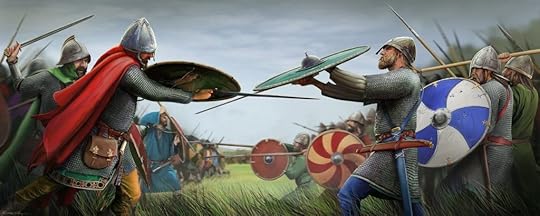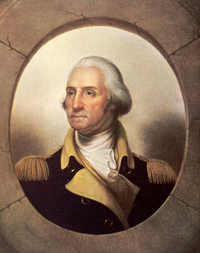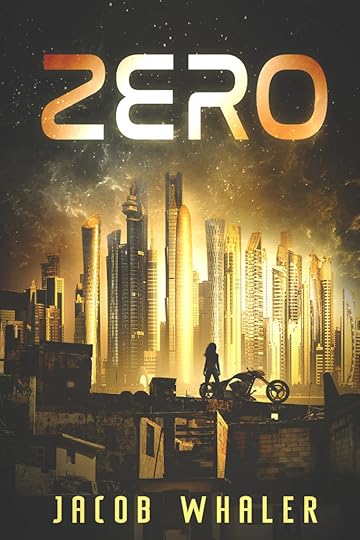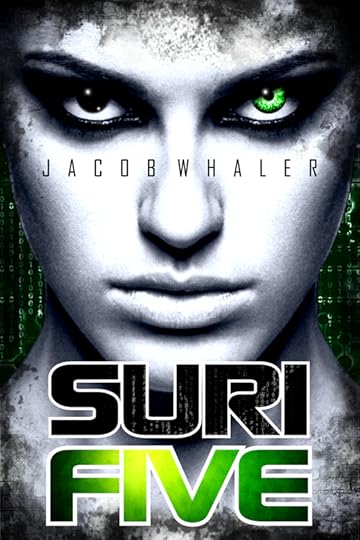Jacob Whaler's Blog
December 23, 2019
Political Discussion = Intertribal Warfare?
Gone are the days of deep and meaningful political discourse. Most of us get our news from highly politicized sources with a clearly staked-out a political viewpoint informing and coloring all content. If you agree with the political viewpoint of the source you’re reading, you’ll likely agree with the content. If you disagree with the political viewpoint, you’ll likely stop reading and move on to more agreeable content. Bottom line: find your tribe and stick with it; no need to reason with people from another tribe because they just don’t get it.
 Republicans vs. Democrats?
Republicans vs. Democrats?We feel safe having real political discussions within our tribe, but political discussions with other tribes are fraught with danger and are best avoided. She’s a Trump supporter. How can we be friends? He’s got a Socialist bumpersticker on his car. I don’t want anything to do with him! It’s a common problem in our world where we have lost the art of reasoned discussion. Why have we lost it? Because it’s hard and requires real thinking, patience, focus and effort. It requires us to suppress deeply engrained instincts about the Other. It’s so much easier to just call the Other Side names (aka the good old ad hominem attack) and slap a label on them or question their motives, intelligence or loyalty to the Constitution. And then move on.
It’s not just a problem that pops up in casual conversations at the checkout line at Walmart. It happens at the highest levels of our political institutions for all too see. Politicians on both sides of the spectrum push for more political tribalism because they rightly perceive that it’s in their short-term personal political advantage.
The problem is, in the long-run, democracies are built on dialog. As we find ourselves increasingly in a world where real political dialog is no longer possible, the future of the Republic is indeed in danger.
December 13, 2018
Are Political Parties the Problem?
Let’s face it, the current world political situation is a goldmine for writers of all stripes–fiction, non-fiction, thriller, mystery, science fiction, whatever. There’s an overabundance of material in every corner of the world. An expectation hangs in the air that we are on the precipice of great changes about to take place. With so much at stake, now more than ever we need writers willing to put their imaginations to work producing ideas and solutions for the world to consider.
Rather than be inspired by the current political situation, it’s easy to be overwhelmed and repelled by the negativity that fills our political discussions. It’s as if two massive armies were sweeping across the US, one made up of Republicans and the other of Democrats, and we are all being forced to choose sides.
I refuse to choose sides.
Good and bad policy proposals abound on both sides of the political divide. We may have reached the limit of what political parties have to offer. At this point, all they are giving us is more and more polarization and hate. We need a different approach, one that will draw us together in constructive dialogue instead of apart into our separate political tribes. I like the approach taken by Evan McMullin and Mindy Finn in their organization Stand Up Republic. They both come from Republican political backgrounds but are reaching out to all parties to “grow a community of Americans to defend democratic ideals, norms and institutions.” It’s an admirable goal.
 He warned about the dangers of political parties.
He warned about the dangers of political parties.George Washington once famously said, “However [political parties] may now and then answer popular ends, they are likely in the course of time and things, to become potent engines, by which cunning, ambitious, and unprincipled men will be enabled to subvert the power of the people and to usurp for themselves the reins of government, destroying afterwards the very engines which have lifted them to unjust dominion.”
Think about it.
December 12, 2018
Is it all about Trump?
So, my newest book, ZERO, is now available on Amazon here. Lots of people have asked me if the novel is about Trump. The short answer is “no.” For starters, I don’t actually think Trump is capable of starting a dynasty that will rule the USA for the next 150 years. I certainly don’t think that he will be able to completely destroy democracy in America. His penchant for blatant lying has turned the majority of Americans against him. The truth is that Trump and his antics have resulted in one constructive outcome: he has managed to unite a majority of Americans from both political parties against him. The bottom line is that American democracy is still intact for now, and Trump just isn’t strong enough or capable enough to take it down.
But let’s be clear. His disregard for traditional norms and institutions, including the Constitution itself, has damaged American democracy. The Ship of State has taken a few major hits and isn’t exactly functioning as well as it should be. It’s still afloat, but needs repairs. Let’s just hope that a major international crisis doesn’t come along like a tsunami and slam into the side.

Back to my book, ZERO. It’s not about Trump, at least not Donald J. It’s about the next demagogue that comes along after we’ve forgotten about the current one. Someone smarter, more capable, and, let’s face it, more evil. The damage that’s already been done to our democracy may never be healed. And the next time the checks and balances are called into question, the internal damage may be just enough to bring the whole structure crashing down. That’s what ZERO is about.
November 20, 2017
Does the Heroine Have to be Likable?
After writing a couple of novels (here and here) with likable heroines/heroes, I decided to go a different direction with my next novel, SURI FIVE. Suri is a mean (some would say vicious) high school girl that doesn’t draw a lot of sympathy from the reader. Her story arc takes her through multiple personal catastrophes not of her own making, and by the end, she’s lost a lot and learned a lot and maybe become a little bit more sympathetic. I’ve heard back from multiple readers that they didn’t like Suri, and I suspect that some of them just put the book down after the first few chapters because they couldn’t take her attitude any more. I suspect this is a sort of cultural bias and entirely predictable for a generation raised on sugary sweet Disney princesses. If you’ve ever watched Japanese movies or read Japanese novels (I highly recommend it), you’ll know that they often don’t have happy endings or happy characters. That’s considered normal in Japan and it’s based on the Japanese view of life as hard, unpredictable and largely out of one’s control. Here in the United States, we tend to take a much more optimistic view of life and expect our novels and movies to reflect that.
 She’s vicious and mean, and that’s OK
She’s vicious and mean, and that’s OKOn the other hand, many of my more adventursome readers have noted that, once they accepted the fact that Suri was who she was, they were able to relax and actually identify with her. This allowed them to experience her growth arc with her. Many of them have told me that the novel made them feel deep emotion and think about ideas and issues they’d never considered before, which is exactly the reaction I was hoping for. Others have said that the novel made them more sympathetic to people who have lived through deep sorrow. By vicariously experiencing the life of Suri, they’ve become less judgmental toward others. Again, this is exactly the reaction I hope for.
There’s a payoff that comes from reading novels that take you out of your comfort zone. And for those of you who are writers, there’s an even greater payoff that comes from throwing aside the usual formulas and venturing off the beaten path.
November 19, 2017
Write and Grow
Reading is easy. Writing is hard. And writing novels is even harder. There are a thousand different ways to do it, and none of them are easy. Don’t be fooled by writers that tell you they love to write. The actual process of writing is shot through with waiting, uncertainty, confusion, discouragement and risk. Much of the time, a writer simply sits with fingers poised over their keyboard as they gather wool in their minds. Of course there are times when the words flow effortlessly and brilliantly, but that is exceedingly rare. So, why do writers write? What is the payoff?
There are many.
The first, most obvious, payoff is the satisfaction/exhilaration of creating order from chaos. On a good day, a writer may begin a writing project with a specific idea of what they want to say. On a more typical day, the writer may only have a general idea. Either way, the actual words remain floating in the infinite ether of the writer’s mind until they are chose and fixed, one by one, on the page. And that’s when the magic happens. When the process is complete, the writer has created something concrete and specific out of chaos. Trust me, that brings satisfaction and exhilaration.
 Writing is hard
Writing is hardThe second payoff is the learning process that takes place in the writer’s mind as they select words and phrases, erase, revise and ruminate on the subject of their work. Distilling it into sequential, specific words takes the writer through a growth arc that leaves them smarter and wiser at the end than when they started. Growth is painful. But that is the point. No pain, no gain. In the end, the most efficient and direct way to master a subject or an idea is to write about it.
November 18, 2017
Dystopia Begins
 He wanted us to live more deliberately
He wanted us to live more deliberatelyA hundred years in the future, the world will be fully plunged into a nightmare of rich versus poor. The top 1% will live in gleaming cities with access to unlimited income, healthcare, technology and pleasure. The rest of the world will make do with squalid slums where life is short, brutish and nasty. We find some version of this dystopia in so many novels (see mine here) and movies that it has morphed into a trope, and it’s now almost an accepted fact that society is on a path to a dark future that no one has the power to change. All around us, the foundations of that future society are being laid, not by all-powerful governments and mega-rich corporations, but by the choices all of us are making today, right now. No single entity or group is dragging us forward to that future. It’s coming to us as a natural result of millions of mindless individual decisions about the things we buy, the content and media we allow to consume our attention, the officials we elect, the way we spend our time, the lies we choose to believe.
What would our descendants of the far future, the ones who live in the dystopia we are creating for them right now, want us to do differently?
I think they would look back and ask us to stop making mindless decisions, to “live more deliberately” in the words of Henry David Thoreau, to actually think deeply about what we are doing and the kind of world we are making for the future.
November 17, 2017
Why Write?
As they say, we have been cursed to live in interesting times. It’s a full-time job just keeping up with the major headlines of each day. And like the pirates say, there be good days and there be bad days. Every day brings lots of wonderful new developments, but the specter of an extinction level event seems to lurk just around the corner.
At times like these, we desperately need great writing to help us make sense of the world. And while we owe a debt of gratitude to journalists and essayists who grapple with the here and now in a direct way, I’d like to make a special plea to the fiction writers among us to keep honing their craft and turning out thoughtful, creative work to guide us through the days ahead. It’s the fiction writers who are constantly asking the “what if” questions and proposing new answers and new ways of thinking about the world. With the help of their creativity, we can find ideas for our own paths through the daily chaos of life.
May 2, 2017
How to Create a Character
Every novel needs good characterization. One key to good characterization is being consistent. What I mean by that is, you shouldn’t have your character with brown eyes in Chapter 1 and blue eyes in Chapter 10, unless the change in eye color really is part of the story. So, how do you keep things consistent with your character? The most direct method is to write it down. Keep a few paragraphs or pages on each character in your book, and list important background information that you can refer to later. That’s the easy part. The harder part is developing a consistent character in terms of the way they act, their mannerisms, the way they react to situations. To do that, you need more than just a list. You need a strong image in your mind of that character to quickly guide you down the path of character development.
One of the most efficient and effective methods I’ve found is to draw on characters that have made strong impressions on me from real life, movies and graphic novels. The novel I just started writing is about a dystopian future where the world is divided into the very rich and the very poor. I needed a strong “sidekick/mentor” character that was an older man, computer savvy and irreverent. So I started going through movie characters in my head. After a lot of thinking, I found one that clicked: it was Beetee from Hunger Games 2. Now, when I write about that character, I have the image of Beetee in my mind and a ready source of inspiration to help me keep that character consistent. Of course, what I’ve found is that a starting image of a character is like a seed: over time that image grows and evolves into something new and different. By the time my novel is published, my character might be very different from where I started. But that’s OK. That’s the way it’s supposed to work.
April 19, 2017
Trumpian War Strategy
Fair warning: this post may end up being complimentary to President Trump. For those of you who are allergic to anything positive about the current POTUS, you may want to just skip this.
So, North Korea’s Ministry of Foreign Affairs is once again threatening to turn Seoul, Korea into a “sea of fire” by means of “thermonuclear war.” If you are the POTUS, what do you do when faced with such over-the-top rhetoric? You respond in kind, which is to say, you don’t act responsibly. For starters, you tell the world that you’re sending a US Navy strike force to hover off North Korea’s coast, and then you don’t really send them. You drop the biggest bomb in your arsenal on another enemy for the world to watch, something that may be taken from an old Chinese proverb (kill the chickens to scare the monkeys). You act unpredictably. You get all the people around you saying something different. In short, you play a game. Will there be war, or won’t there be? Try to keep them guessing.
The thing is, this may actually be the best strategy for dealing with North Korea.
Aspiring speculative novelists, please take note. Any stories about future wars should take this approach into account. War is no longer a straightforward enterprise. War is now just a branch of public relations.
Trumpian War Strategy
Fair warning: this post may end up being complimentary to President Trump. For those of you who are allergic to anything positive about the current POTUS, you may want to just skip this.
So, North Korea’s Ministry of Foreign Affairs is once again threatening to turn Seoul, Korea into a “sea of fire” by means of “thermonuclear war.” If you are the POTUS, what do you do when faced with such over-the-top rhetoric? You respond in kind, which is to say, you don’t act responsibly. For starters, you tell the world that you’re sending a US Navy strike force to hover off North Korea’s coast, and then you don’t really send them. You drop the biggest bomb in your arsenal on another enemy for the world to watch, something that may be taken from an old Chinese proverb (kill the chickens to scare the monkeys). You act unpredictably. You get all the people around you saying something different. In short, you play a game. Will there be war, or won’t there be? Try to keep them guessing.
The thing is, this may actually be the best strategy for dealing with North Korea.
Aspiring speculative novelists, please take note. Any stories about future wars should take this approach into account. War is no longer a straightforward enterprise. War is now just a branch of public relations.



